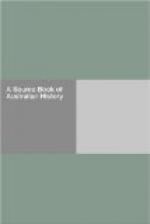This distance of twelve thousand miles ought to be performed by a fast sailing ship in twelve weeks, at the rate of a thousand miles per week, which is the fair average running of a good ship on distant voyages; but it is better to allow something for light winds and calms near the Equator, and to say in round numbers one hundred days in all, which is rather more than fourteen weeks.
This is Port Adelaide! Port Misery would be a better name; for nothing in any other part of the world can surpass it in everything that is wretched and inconvenient, packages of goods and heaps of merchandise are lying about in every direction as if they had cost nothing. Stacks of what were once beautiful London bricks crumbling away like gingerbread, and evidently at each returning tide half covered with the flood; trusses of hay, now rotten, and Norway deals, scattered about as if they had no owner—iron ploughs and rusty harrows—cases of door-frames and windows that had once been glazed—heaps of the best slates half tumbling down—winnowing-machines broken to pieces—blocks of Roman cement, now hard as stone, wanting nothing but the staves and hoops—Sydney cedar, and laths and shingles from Van Diemen’s Land in every direction; whilst on the high ground are to be seen pigs eating through the flour-sacks, and kegs of raisins with not only the head out, but half the contents; onions and potatoes apparently to be had for picking up. The sight is disheartening. What with the sun and the rain—the sand and the floods—the thieves with four legs and the thieves with two—the passengers hug themselves at the recollection that they have brought no merchandise for sale, glad enough to be able to take care of themselves. The sooner they get out of this horrid hole the better, so they enquire if there is any coach to the town—they are answered by a careless shake of the head, and so, like good settlers, they determine to set off and walk, carrying their light parcels with them, and leaving the heavy things with a friend who refuses to go any further. They ask for a drink of water before starting—there is not such a thing to be had; but the bullock carts are expected down every minute with the usual supply! “What, no water?” exclaims our passenger. “No, sir, but the Commissioners are sinking a well, though they have not yet found any but salt water; but they are going to dig in another place, shortly, we understand.”
Away they start for the City of Adelaide, and after ten minutes of rough walking through the loose sand, which is fatiguing enough, they gain the firm and beaten road, with the cheerful hills before them, glad enough to have overcome their morning troubles. Though very warm the walk is agreeable, and out of a cloud of dust before them, they soon descry a dray or two, each drawn by a long line of bullocks. They perceive by the splashing of the water from the open bungs that the casks contain the daily supply for the port, and the drivers very cheerfully give




